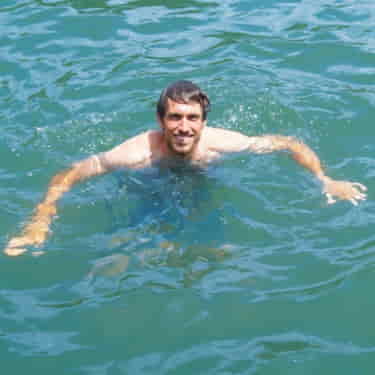As a late adult swimmer, and someone who has struggled with a long term fear of deep water, I am determined to understand how I can use my natural human buoyancy to my advantage and reduce my risk of drowning.
As a general rule, some people are naturally more buoyant than others, however, buoyancy alone is not enough to reduce the risk of drowning. Learning to float, treading water or keeping calm in a panicked water situation is a better strategy to reduce the risk of drowning.

To really understand this very important concept and improve water understanding, in this article, I am going to investigate:
- Can humans naturally float?
- Why do some people float better than others?
- Why do people drown when the human body actually floats in water?
- How long can a person float in the water?
- Can you drown if you are a good swimmer?
- How do you float to survive in the water?
Can Humans Naturally Float?
Some people seem to float effortlessly, while others sink like a stone. So, is the statement that humans naturally float fact or fiction?
Why Do Humans Float In Water?
Typically, the human body is less dense compared to water, so it will naturally float. However, the level of buoyancy between people differs based on factors such as fat content, muscle mass, and lung inflation. Therefore, some people will find it much harder to float than others.
For example, men will find it harder to float compared to women, as on average, they have a higher muscle content and lower centre of gravity.
For an object to float, the density of the object should be less than the density of the fluid.
Flotation = Density of Object < (less than) Density of Water
Given that the density of water is 1g/cm3, as long as the density of the object, however big it physically is, is less than this number, the object will float.
Here is a chart showing the relative density of the human body compared to water, listing other well-known items so you can see how we compare:
| Object | Relative Density To Water (g/cm3) | Will It Float? |
|---|---|---|
| Human Body | 0.98 | FLOATS |
| Feather | 0.0025 | FLOATS |
| Gold | 19.30 | SINKS |
| Ice | 0.92 | FLOATS |
Why Do Some People Float Better Than Others?
Perhaps you float like a cork and can’t understand why others cannot float? Or perhaps you sink like a stone and cannot comprehend how someone can kick back and float so effortlessly?
The reason some people naturally float better than others is because of differences in the human body composition.
Can Everyone Float?
As a general rule, everyone will float, but some people will float better than others if they intake more air into their lungs, have less muscle and have more fat content, which is more buoyant. The proportion of these factors will determine why some people float more effortlessly than others.
That said, there is still some technique involved with floating and many accomplished swimmers overlook the importance of learning the skill of floating.
Research conducted by Professor Mike Tipton at the University of Portsmouth revealed that many people incorrectly believe they cannot float when this is just not true, as the human body is naturally buoyant.
His team conducted research with over 85 people of different body shapes, ages, sizes, and genders, which revealed that everyone truly can float. [source]
Therefore, if you believe you cannot float, rethink – as it is not true. It is possible to work on your technique to improve. Learning to float can save your life.
| Factors Influencing Naturally Buoyancy | Does It Help Naturally Buoyancy | Comments |
|---|---|---|
| Fat Content | Yes | Fat naturally floats. Therefore people with great fat on average find floating easier. |
| Muscle Content | No | Muscle has a relative density to the water of slightly greater than 1, meaning that muscle sinks. |
| Air In The Lungs | Yes | If you take a deep breath, with lots of air in your lungs, you will remain buoyant. |
| Body Composition | Yes | This depends on how much other air is in the body and body fluids. |
If you want to learn how to swim or want to improve your swimming technique to become a more efficient and better swimmer, then I recommend the Total Immersion Swimming Method.
This is a video course that is on Udemy (view here), that I have used to learn how to swim as an adult. This has been life-changing for me.
Why Do People Drown When The Human Body Actually Floats In Water?
It is generally agreed that the human body has “positive buoyancy” meaning that it will naturally float. Although we all have different levels of buoyancy, overall, everyone can float.
Therefore, it is natural to ask, “why do people drown if the human body has positive buoyancy?”
As a general rule, drowning involves getting water into the lungs. It has very little to do with what depth of water you are in. In order to float to survive in a panicked water situation, you must turn on your back and relax. The key is to get into a relaxed state and stop water from getting into your lungs.
The floating technique can be learned and you must relax to embrace it.
Research has found that the act of lying on your back is very important to survival. Overall, it is a much less stressful position to be in and can allow the body to relax that bit further to help catch your breath. [source]
Many powerful swimmers overlook the importance of being able to float or tread water. We are all so busy with perfecting or freestyle stroke; we forget that swimming is also a very important life-saving skill and that being able to float is a key for survival.
There are many tragic reasons people drown, although floating is possible. Here are some factors listed by the Center for Disease Control and Prevention, that contribute to a greater risk of drowning.
| Drowning Risk Factor | Comments |
|---|---|
| Not being able to swim | Being able to swim is important for survival, but being able to float is really important. |
| Missing or ineffective fences around the water | Often children and adults can accidentally get into dangerous areas as the signs and warnings are just not visible. |
| Lack of close supervision | We should all be supervised in the water and never swim unsupervised or alone. |
| Location | This seems to depend on age. For example, bathtubs are where most under 1-year-olds are at risk and natural waters such as lakes and rivers are a big risk area for teenagers. |
| Not wearing life jackets | The US Coast Guard reported that for boating-related deaths in 2019, 86% were not wearing life jackets. |
| Drinking Alcohol | Alcohol impairs our judgement and balance, increasing the risk of water-related incidents. |
| Using drugs and prescription medications | Similar to alcohol, some drugs can increase the risk of drowning as the side effects can affect our judgement and motor skills. |
How Long Can A Person Float In The Water?
As mentioned, floating depends on the person’s ability to lie back and relax.
As a general rule, a person can float in the water indefinitely if they are fully relaxed on their back and do not exhaust energy. This is a proven survival strategy. [source]
Typically, an average person can tread water for 2 to 4 hours, which is the act of being upright and gently moving the arms and legs to stay afloat. For stronger swimmers, this can increase to over 8 hours. The world record for treading water is 85 hours.
Using a combination of floating on your back to stay relaxed and alternating with treading water to keep yourself warm if needed, you can survive for hours or until rescued.
Learn To Swim Right Now!
Feel more comfortable and confident in the water.
Can You Drown If You Are a Good Swimmer?
It is very possible to drown, even if you are an excellent swimmer.
In my mind, I always believed that being a strong swimmer would allow me to avoid this fate, but the more I research, the more I realise that being a good swimmer only reduces your risk of drowning.
Being an excellent swimmer will get you out of tricky situations to safety, but to survive a panicked water situation, research has shown that the first step to survival is to avoid thrashing and swimming hard and to turn on your back, float and relax. [source]
“simply turn on your back, float and relax“
Professor Mike Tipton MBE
Here are some of the reasons why good swimmers drown every year:
1. Panic
I hope you never find yourself in this situation, but panic in a water situation is scary and takes tremendous mental control to have the awareness to stop, turn on your back, float and relax.
I have found myself out of my depth in a rough seas situation previously, and panic is the first problem to deal with – not the water.
Staying still in the water may sound counterintuitive when your first instinct is to get the hell out. But taking a moment to calm the panic, turn on your back and float can gain valuable seconds that will control your breathing and help you assess the situation with a more controlled mind.
Big wave surfers, who are amongst the world’s best swimmers in crazy situations, have to learn to deal with panic and control their minds.
As part of their training, they will try to extend their breath-holding capacity and simulate scary underwater situations where it is dark and they are being held under by a force.
This allows their body to respond to stress and panic in a controlled situation, so when it happens for real, they are prepared and will fight the urge to panic.
Great swimmer or not, you must prepare to handle panic in the water.
2. Cold Water
Cold water can be a silent killer for swimmers. [Source]
A confident swimmer might jump into a body of outdoor water, not realising the impact that cold water has on the body.
Cold water will increase your heart rate, blood pressure and strain on your heart.
A good swimmer might instantly try to “fight” the cold water, which creates panic. Our fight-or-flight response will naturally kick in and a swimmer may thrash around in the water to get warm and get out.
However, research has found that this is a mistake.
According to Professor Mike Tipton, “Your first instinct is to get out – to swim to safety. But you need to fight this instinct until the cold shock passes, usually within 60–90 seconds. Then float on your back until you’re able to catch your breath.” [source]
“Your first instinct is to get out – to swim to safety. But you need to fight this instinct until the cold shock passes, usually within 60–90 seconds. Then float on your back until you’re able to catch your breath.”
Professor Mike Tipton – https://www.port.ac.uk/news-events-and-blogs/features/float-to-live
3. Over Confidence
As a good swimmer, you should be proud of your skills. However, some swimmers overestimate their abilities and go too far or too deep with devastating consequences.
This is very easy to do. Many of us follow a crowd or have a go at a particular swim only to realise halfway through that we are not at all comfortable.
If you swim a mile a day in your local pool, it is natural to think you can swim a mile in a lake, but this could be a false assumption.
Swimming in a lake differs greatly from a pool. There will be wind factors blowing you off course, underwater obstacles, currents in big lakes, poor visibility and, most importantly, no pool wall to kick off every 25 meters.
So many confident pool swimmers will take on big open water swims, not realising it is a totally different swimming environment.
This is one area where excellent swimmers are at risk.
4. Open Water
Nearly all open water swimmers are very confident and excellent swimmers.
Open water comes with a higher level of drowning risk because of the environment.
- Open water rarely has lifeguards keeping watch
- Water temperature can vary dramatically and catch swimmers out
- Visibility can be a problem, and it is harder to navigate.
- Other water bodies such as boats are a risk.
- Underwater obstacles can cause problems.
All these extra risks that come with open water swimming will increase the drowning risk of a good swimmer.
Consider taking a buoyancy aid such as an inflatable float and dry bag for extra security. Here is an Amazon link to the inflatable swim buoy and bag that I have.
5. Shallow Water Blackout
Confident swimmers may believe they can hold their breath for a long time underwater, but this is a really dangerous thing to do.
You may think you are safe in the shallow end, but if you hold your breath underwater for too long, you could blackout and not re-surface. The depth of the water is irrelevant.
With water blackout, the severe lack of oxygen can cause blackout without warning and can happen to any swimmer.
Shallow water blackout is a genuine threat to elite swimmers, who try to swim lengths taking as few breaths as possible.
The lack of breathing leads to insufficient oxygen levels and if a swimmer hyperventilates before breathing, they may not have the carbon dioxide in their body, which tells their brain to take a breath. They will have passed out before they are even aware that there is a problem. [source]
6. Unsupervised Swimming
Good swimmers tend to be water confident and will be more inclined to swim unsupervised.
We should all be supervised in the water or at least have a friend who can help if things go wrong.
Swimming alone is never a good idea, as there will be no one there to pull you out if you have an accident.
How Do You Float To Survive In The Water?
Float To Live
I may be a confident swimmer, but all my research has shown me that in order to survive in a tricky water situation, I must be able to float.
Recently in the UK, a boy survived an ordeal at sea, just because he remembered watching this “Float To Live” video the week before on a BBC documentary. [source]
Rescuers praised him when they found him on his back, with his arms and legs spread, shouting for help in the water near Scarborough on 31 July.
https://www.bbc.co.uk/news/uk-england-york-north-yorkshire-53687115
This advice saved his life, so take 1 minute of your time and check this important video from the RNLI out:
Float On Your Back
If you don’t already know how to float on your back, this is a skill worth the time to learn.
Personally, I recommend getting a swim instructor to help you learn this very important life skill.
The following video shows you how to float on your back to give you some hints and tips on where to start.
Being able to float in water is an important life skill. If you want to learn how to swim today by following online tuition or want to improve your swimming technique then I highly recommend checking out the total immersion swimming method. Here is a link. This is how I learned to swim, and it is one of the best things I have ever done.
Learn To Swim Right Now!
Feel more comfortable and confident in the water.

